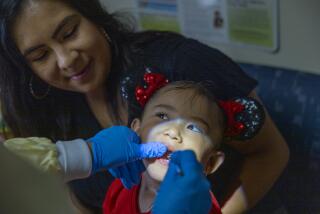Dentists Urged to Tell Truth About Pain
- Share via
SAN FRANCISCO — Dentists don’t have to wear Superman suits, install hot tubs or use other gimmicks to reduce their patients’ fears, says an expert who urges dentists to stop lying about pain and listen to patients’ concerns.
“Dental fears germinate from us not telling the truth. Dentists said it wouldn’t hurt, and it did hurt,” Dr. Carl H. Jepsen told some dentists at the American Dental Assn.’s annual meeting here recently.
The San Diego dentist and behavior researcher said three-quarters of Americans feel some anxiety about dental treatment--though many overcome it easily--and one-quarter suffer extreme anxiety.
The dental association estimates that up to 12 million Americans are “dental phobics” who are so afraid they simply refuse to get dental care--”even in the face of pain and infection,” Jepsen said.
Counseling Reduces Fears
But counseling performed by a dentist in 30 minutes often can significantly reduce patients’ fears, said Jepsen and Alan Rappoport, chief psychologist at the Center for the Treatment of Dental Fear at San Francisco’s Mount Zion Hospital.
Dentists should establish rapport with their patients and discuss their fears, provide a warm, caring office environment, present a relaxed image and administer adequate anesthesia, they said.
Many dentists use stereo headphones or electronic games to distract patients, and Jepsen said he knows of one dentist who dressed in a Superman costume and installed a hot tub in his office.
“I’m not sure we have to go that far to relax our patients,” he said, adding that “caring, loving, gentle dentists . . . will have people beating down your doors.”
Jepsen said patients can reduce their anxiety by talking to their dentist about their fears, avoiding beverages with caffeine before a dental appointment, breathing regularly during dental treatment instead of holding their breath and crossing the hands over the abdomen during treatment.
Sign to Proceed
He also said patients and their dentists should agree before drilling or other treatment starts that raising a hand is a signal for the dentist to pause until the patient is ready to proceed. This gives the patient a sense of control over what is happening.
“The patient has to experience a sense of control in treatment,” Rappoport said, adding that a sense of helplessness causes greater fear than actual pain.
Jepsen said fear of dentistry often stems from a patient’s relatively minor unpleasant or painful experience with dentists as a child or from hearing scare stories told by friends or relatives.
Some patients are fearful because they “watched movies like ‘Marathon Man,’ ” in which Sir Laurence Olivier played a fugitive Nazi war criminal torturing Dustin Hoffman with a dentist’s drill, he added.
Time Saver
Dentists should try to alleviate their patients’ fears not only to help the patients but because “people who are relaxed are much easier to work with,” Jepsen said, adding that it takes 20% more time to treat an agitated patient.
Not all fearful patients can be helped by counseling by the dentist, Jepsen said, and some will need to be referred to psychologists or psychiatrists.
Dr. Paul Glassman, director of Mount Zion’s fear treatment center, said he sometimes finds it necessary to clean only a single tooth during each of a dental phobic’s first few visits until the patient feels comfortable with more extensive treatment.
Some dentists use hypnosis, progressive relaxation or other behavior modification methods to reduce fear. Jepsen outlined one method in which patients are taught to combine thoughts of success and confidence with fearful dental memories as a way to overcome the fear.
Walking the patient through the dental office before treatment begins also can be relaxing, he added.
More to Read
Sign up for Essential California
The most important California stories and recommendations in your inbox every morning.
You may occasionally receive promotional content from the Los Angeles Times.













